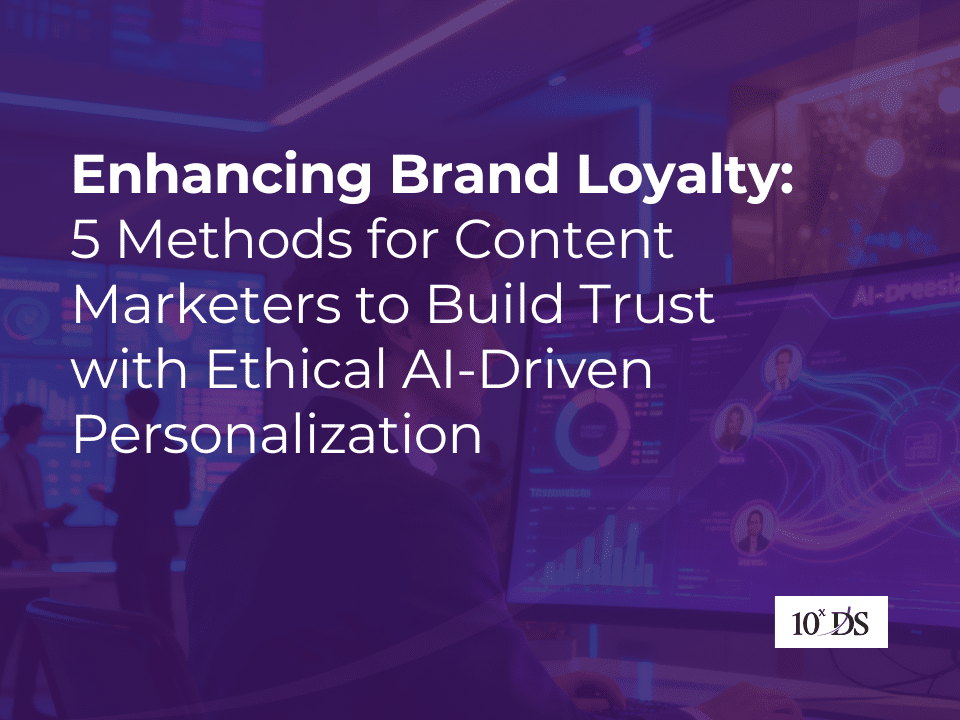
Enhancing Brand Loyalty: 5 Methods for Content Marketers to Build Trust with Ethical AI-Driven Personalization
In today’s digital landscape, content marketers face the challenge of connecting with audiences in meaningful and personalized ways. Consumers are no longer satisfied with generic messages; they expect content that speaks to their unique preferences, needs, and behaviours. Responsible personalization powered by artificial intelligence offers a pathway to achieve this. By focusing on AI for content personalization, marketers can tailor experiences that resonate with individual users while prioritizing ethical considerations. This approach directly addresses how to build brand trust, ensuring that consumers feel valued and respected rather than manipulated.
AI for content personalization uses intelligent algorithms to analyse user behaviour and deliver content that aligns with individual interests. When applied thoughtfully, it fosters brand trust by emphasizing transparency, integrity, and a user-centred experience. A recent report from M Accelerator highlights that startups leveraging AI for personalization experience 1.7× higher revenue growthand achieve up to 50% lower customer acquisition costs. Content marketers who embrace intelligent content personalization with care can create lasting impressions that turn casual visitors into loyal advocates.
The challenge lies in balancing innovation with responsibility. AI-enabled content tailoring allows for dynamic content adjustments, such as recommending articles based on past interactions or highlighting products that align with a user’s preferences. However, without trust, these efforts can backfire. Exploring how to build brand trust means emphasizing transparency, consent, and value delivery. The following five methods provide a practical roadmap for content marketers seeking to leverage AI ethically while building stronger connections with their audience.
Method 1: Prioritize Transparent Data Practices
Transparency forms the foundation of any successful personalization strategy. Consumers want to know how their data is being used and why they are receiving specific recommendations. Content marketers should clearly communicate how information is collected and leveraged in AI for content recommendations. For instance, when implementing recommendation systems, simple explanations of what influences the suggestions can make users feel informed rather than surveyed.
To implement transparency effectively, brands can integrate privacy notices within content platforms and describe how AI for content personalization relies on anonymized data to suggest relevant topics. Making it clear that data is collected responsibly demonstrates respect for user privacy and fosters trust. Frequent updates on data policies create a sense of partnership between brand and consumer, ensuring that users feel in control of their digital footprint.
Integrating feedback mechanisms is another important step. Allowing users to question or adjust personalization settings not only empowers them but also reinforces the brand’s reliability. For example, an email newsletter could include a section explaining how content is tailored based on reading habits, along with an easy option to update preferences. This approach transforms AI-powered personalization into a collaborative experience rather than a one-sided operation.
Content marketers who prioritize transparent data practices see improved engagement, as consumers are more willing to interact with systems they understand. Regular audits of data handling processes can ensure compliance with privacy standards, and sharing insights from these audits publicly can further enhance credibility.
Method 2: Emphasize Ethical AI Development
Ethical considerations in AI for content customization are essential for maintaining consumer confidence. Algorithms can unintentionally amplify biases if not carefully designed and monitored, which may lead to unfair or exclusionary recommendations. Content marketers must ensure that AI models are developed with diverse training datasets that accurately reflect various user demographics.
Auditing AI algorithms for fairness is a proactive way to avoid scenarios where certain groups receive suboptimal or irrelevant content. Ethical AI should aim for inclusivity, ensuring every user feels represented and valued. By taking these measures, brands strengthen trust, as consumers recognize a commitment to integrity over short-term gain.
Collaborating with AI ethics experts and regularly reviewing personalization outcomes helps identify potential issues early. Documenting the ethical guidelines used in AI-driven content personalization provides a reference for both internal teams and external stakeholders, reinforcing accountability and transparency. Sharing these practices in blog posts, FAQs, or newsletters educates users about the brand’s values and demonstrates a long-term commitment to responsible AI.
Ethical AI also involves careful data management. Marketers should collect only the data necessary to deliver meaningful experiences, store it securely, and avoid sharing it with unauthorized third parties. By respecting privacy and handling information responsibly, brands create a foundation for fostering brand trust, showing that personalization is applied thoughtfully and ethically.
Method 3: Offer User-Controlled Customization Options
Empowering users to take control of their personalized experiences enhances trust and engagement. Brands can provide options that allow users to adjust AI-driven content recommendations, such as opting out of certain data usage, selecting preferred topics, or setting the level of personalization they are comfortable with.
This user-centric approach shifts power back to the consumer, making personalization feel collaborative rather than imposed. Dashboards where users manage their preferences and update settings are practical tools that improve satisfaction. For example, a streaming platform could let users choose genres they want more or less of, which helps refine future recommendations and increases perceived value.
Implementing simple, intuitive interfaces ensures that users can easily customize their experience without frustration. Tutorials, guides, or step-by-step prompts can further ease navigation. Additionally, regular reminders to update preferences keep personalization dynamic and responsive to changing interests. This proactive approach not only boosts relevance but also reinforces the brand’s commitment to listening to its audience, an essential component of building brand trust.
Method 4: Focus on Delivering High-Value, Relevant Content
Relevance is at the heart of effective personalization. Brands that deliver content which genuinely adds value to a user’s life stand out in a crowded digital landscape. AI for content personalization allows marketers to go beyond basic personalization by analysing user journeys, identifying pain points, and offering solutions through targeted articles, videos, or recommendations.
High-value content anticipates user needs and provides practical, actionable information. For instance, an educational platform can use AI to suggest advanced modules based on a learner’s progress, ensuring continued growth and engagement. Similarly, a lifestyle brand might recommend products or content aligned with past interactions, improving both the relevance and timeliness of messaging.
Quality control is essential. Avoiding clickbait, irrelevant recommendations, or low-effort content maintains credibility and reinforces the perception that the brand respects its audience. Incorporating user feedback loops—like ratings, surveys, or engagement analytics—ensures that content personalization evolves over time. By consistently delivering meaningful content, marketers strengthen trust and demonstrate that AI is a tool for enhancing the consumer experience rather than simply driving sales.
Method 5: Maintain Authentic and Consistent Communication
Authenticity in messaging strengthens relationships and enhances trust. AI-powered personalization should reflect the brand’s true voice, values, and personality across all interactions. Consistency in tone, style, and messaging prevents disjointed experiences and ensures that the audience feels a coherent and reliable presence.
Personalized content should align with broader brand narratives, reinforcing identity rather than creating fragmented experiences. Chatbots, virtual assistants, and AI-driven recommendation engines can facilitate responsive interactions, enabling consumers to explore content, ask questions, or receive guidance tailored to their needs. Two-way communication ensures that personalization remains interactive, allowing marketers to gather feedback and refine AI algorithms accordingly.
By responding personally to user input and engaging in genuine dialogues, brands humanize their digital presence. Even as AI scales personalization, authenticity remains central. For example, corporate blogs that maintain a professional yet approachable tone in their recommendations help users feel familiar with the brand. Ethical AI content personalization allows brands to scale interactions without sacrificing this essential human touch, fostering long-term loyalty and credibility.
Wrapping Up: The Path Forward for Trustworthy Personalization
Content marketers have unprecedented opportunities to leverage AI for content personalization responsibly. By adopting these five methods—transparency, ethics, user control, value delivery, and authenticity—they can effectively create meaningful engagement with their audience and demonstrate how to build brand trust.
AI for content personalization, when applied with care and integrity, transforms interactions into connections that feel personal, relevant, and ethical. Responsible strategies allow brands to stand out as thoughtful, consumer-focused, and trustworthy in a world where over-personalization can quickly feel invasive.
Ultimately, content personalization should be viewed as a trust-building tool. Brands that embed transparency, ethics, and user empowerment at the core of their AI strategies not only enhance engagement but also cultivate loyalty, advocacy, and long-term consumer relationships. By committing to responsible AI-driven content customization, marketers can ensure their efforts are both effective and ethical, delivering meaningful experiences that go far beyond clicks or conversions.


